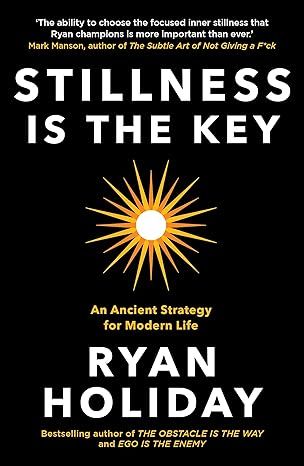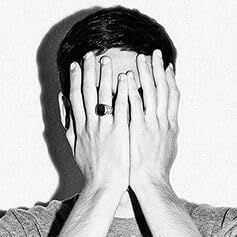Stillness is the Key: An Ancient Strategy for Modern Life
4.7 out of 5
9,966 global ratings
Throughout history, there has been one quality that great leaders, makers, artists and fighters have shared. The Zen Buddhists described it as inner peace, the Stoics called it ataraxia and Ryan Holiday calls it stillness: the ability to be steady, focused and calm in a constantly busy world.
Drawing on a wide range of history's greatest thinkers, Holiday shows us how crucial stillness is, and how it can be cultivated in our own lives today. Just as Winston Churchill, Oprah Winfrey and baseball player Sadaharu Oh have done, we can all benefit from stillness to feed into our greater ambitions - whether building a business or simply finding happiness, peace and self-direction.
Stillness is the key to the self-mastery, discipline and focus necessary to succeed in this competitive, noisy world.
288 pages,
Kindle
Audiobook
Hardcover
Paperback
First published October 7, 2020
ISBN 9781788162067
About the authors
Ryan Holiday
Ryan Holiday is one of the world's bestselling living philosophers. His books like The Obstacle Is the Way,Ego Is the Enemy,The Daily Stoic, and the #1 New York Times bestseller Stillness Is the Key appear in more than 40 languages and have sold more than 5 million copies. Together, they've spent over 300 weeks on the bestseller lists. He lives outside Austin with his wife and two boys...and a small herd of cows and donkeys and goats. His bookstore, The Painted Porch, sits on historic Main St in Bastrop, Texas.
Read more
Reviews
Patrick J. Stiles
5
Ryan's Best Book, Truly Life Changing & A Guide On How to Live Life <3
Reviewed in the United States on May 21, 2020
Verified Purchase
This book is unbelievably good. I thought it was going to say -- you should meditate and some basic advice on things I'm already doing or aware of. While he mentions meditation briefly, this book talks about many many different areas of life.
From believing in a higher power to owning material possessions - he covers all the things that really matter.
Like his other books, and something he is soooo good at, he peppers in stories from famous athletes and celebrities to bigger than life historical figures. He draws on lessons from Jesus, Buddha, the 12 steps and (obviously) the stoics. So this isn't just for people who fetishize one school of thought.
Not that it matters to most people, but I also want to mention as someone who's in recovery, that Ryan is spot on with his understanding of the 12 Steps and the fellowships that embody them. This is very rare... But rather he gets the deeper spiritual meaning of things, like being of service.
So while I'm not an expert stoic or buddhist, I trust that he's turned these ancient traditions into a modern day piece of philosophy that is easy to consume and very practical.
And that is just the thing... This book is a book of philosophy written for the 21 century -- where we have smart phones, social media, remote work and globalization. Personally, I've tried to get into the some of the ancient texts on these topics, but I always struggled to really wrap my head around them, since they are written for such a different time with such a different style than modern communication... But not with this.
I'm very excited to see what else he creates in the years to come.
Now that I just finished this book, I'm quite literally going to restart it.
Read more
Amazon Customer
5
Wow
Reviewed in the United States on July 16, 2024
Verified Purchase
Just wow.
Michael J
5
Ryan Holiday's best book so far
Reviewed in the United States on November 24, 2019
Verified Purchase
Ryan Holiday has become something of an expert on Stoic philosophy, and his previous books have mostly focused on that style of thinking. That's great, but I was pleased to see him branch out a bit more in this book.
In this book, he writes about the need for quiet time and reflection, and how important it is in order to be happy and productive. One thing I really liked about this book was how he also gives examples from other schools of thought on the topic of stillness, such as Buddhism and Christianity, as well as Stoic, Cynic, and Epicurean philosophy.
The book is divided into three sections, for Mind, Spirit, and Body. In the "Mind" section, he writes about the need for mindfulness, and being present in the moment. He recommends habits such as journaling, which allow you to commit your thoughts to paper, so that you can empty your mind for thinking about more important topics.
In the "Spirit" section of the book, he talks about how most effective people have a faith of some sort, but he doesn't promote any particular creed or faith. He also talks about cultivating an attitude of virtuous living, and accepting life as it is, and being happy with what you have. This all resonated deeply with me, since for the past several years, my own personal beliefs have tended mostly towards Buddhism.
Finally, in the "Body" section of the book, he talks about the importance of getting enough of both exercise and rest, the benefits of going for long walks, and avoiding "escapism."
For me, reading books like this inspire me to do the things I know that I should be doing. Almost everything in the book is either common sense, or things I already know are useful habits to cultivate. However, Holiday's presentation of them ties them all together and reinforces how important they are, and the book left me feeling committed to trying harder to implement them in my life.
If you're looking for an easy-to-read book that will inspire you to become a better person, this book is worth picking up.
Read more
10 people found this helpful
Tyler Cannon
5
Clear, Concise, and Essential Reading for our Modern Life-- Holiday Kills it Yet Again
Reviewed in the United States on November 5, 2019
Verified Purchase
Ryan Holiday is killing it, and everyone needs to pay attention.
He's killing it for our benefit.
This is a book that dissects ancient scripts and lessons from history, that makes connections and ties ideas and provides keen insights in an easy to understand (and tangibly compact) manner. The idea of "Stillness" seems foreign to most people (even myself), as we can think of some ancient and wise person sitting in a garden with a coy pond, mist hovering just above the ground, chimes sounding in the far distance. The reality is that the idea of "Stillness" come from inside of us all, and it is within our choices to find it, and use it.
Ryan paints this idea masterfully. Here is a book that is small in physical size, but carries immense wisdom. For those who subscribe to his reading list, as well as Daily Stoic and Daily Dad, we see familiar concepts throughout all of his writing, based in Stoicism, but also delves into ancient Eastern philosophy, as well as Western philosophy. As always, Ryan is interested in what will help us to live -and thus die- in the best way possible. Dozens of anecdotes from historical figures (both those whom we admire and those whom serve as a lesson of what not to be) he is instrumental at illustrating these points.
If you're looking for a deep-study, getting into the molecular structure of "Stillness" and philosophy, this is not the place. The chapters are small and digestible four our understanding and our benefit. For something to be profound it doesn't have to be gigantic and full of four-syllable words. This is palatable, easy-to-understand-but-difficult-to-apply type stuff. It requires work. It's a challenge. It's also okay to disagree with what he writes, as long as it prompts the reader to seek the right answer (if only for themselves) to live better.
This is (another one of) Ryan's gift to the world, and we are all better off having read it. I know I am.
Read more
Gymbeaux
5
Another Holiday Must Read!
Reviewed in the United States on December 20, 2020
Verified Purchase
This is the fourth Ryan Holiday book I have read. The other three were Ego is the Enemy, The Obstacle is the Way, and Conspiracy. Like those three books, this book is an excellent read as well. I especially like the way in which Holiday writes. He makes his points using historical figures and events to do so and his writing style is easy to read and understand.
Disclaimer. I am well aware of how many people who should know about such things recommend that people SHOULD engage in stillness or meditation. I have tried and have failed primarily because when I attempt at stillness and quietness, my head wants to explode because of the long-time suffering from Tinnitus, the ringing in my head that never ceases and is enhanced whenever I am in total silence. It is very depressing to say the least. Yet even for me, this book is God-sent because it reinforces a life you would want to live by. It is extremely difficult for me to imagine someone reading this book and not improving their outlook on life. It is that good.
That aside, I still found Holiday’s book fascinating. The following quote from book explains why YOU should read it as well as anyone who you value in life: “Confucius and his followers spoke constantly of the cultivation of wisdom, saying that it is achieved in the same way that a craftsman develops skill: by putting in the time.” Everyone could benefit from reading this book but I would suggest that everyone over the age of four should at least read the chapter titled Limit Your Inputs. Holiday is so very much on target and when you read just this one chapter you KNOW that he is and you can probably see yourself in the people he describes and trust me, that is NOT a good thing.
Holiday’s book is a well written “how to” book on creating a better life not only for you but also for the people that surround you that you love and who love you. A quote from the book is right on point when it comes to defining the value of maintaining a personal journal: “That is what journaling is about. It’s spiritual windshield wipers, as the writer Julia Cameron once put it.”
Who should read this book? From the book: “People who don’t read have no advantage over those who cannot read.” If YOU read this book and just practice some of Holiday’s advice, your life would be a better for having read it. If two read it, double the results. But if an entire country were to read and practice its lessons, the world would truly be a better place to live for eternity! Everyone should read and practice this book.
Would I read it again? There would be no need, except to locate specific quotes from people throughout history that you may want to use.
Would I give it as a gift? ABSOLUTELY!
Read more
36 people found this helpful
Craig M
5
Though provoking easy read
Reviewed in the United States on May 29, 2024
Verified Purchase
The book was an easy read. It made me think and reflect on various things that we do in life and should potentially start/ stop doing.
3 people found this helpful
Peter Butler Jr.
5
An excellent tonic to the noise
Reviewed in the United States on September 15, 2020
Verified Purchase
Stillness is the Key is the third and final volume of Ryan Holliday’s trilogy, also containing, The Obstacle is the Way and Ego is the Enemy.
In this volume, Holiday continues with the same style of quotes, historical anecdotes, and pithy commentary. The book is divided into three sections: the mind, the spirit, and the body. Holiday says, “the aim of this book is simply to show how to uncover and draw upon the stillness we already possess” (7).
In finding stillness in the mind, we must focus on the now – the present – the only reality that exists – and put the past and future away from us. We need to ask ourselves in every moment, “Is this necessary” (34), and, if not, let it go. We need to stop overanalyzing and just do the work that needs to be done (39). We need to seek the wisdom available to us from history (48).
In finding stillness in the spirit, we seek virtue – moral and civic excellence in our lives (98). We give up lust (114). We seek spiritual strength by examining each impulse and letting it pass if it is a bad one (118). We recognize something greater than ourselves (134).
In finding stillness in the body, we care for our body, we bring it into the forest, we give it ample rest (170), we exercise, have hobbies, commit to causes greater than ourselves (183), learn to say no (189), set a routine (199), gid rid of all the stuff we don’t need (208), and take time for solitude and literal quiet and stillness (219).
One of the things that Holiday advises we do is to seek out the wisdom of history. He does that in his books, and I find myself being encouraged and challenged to be a better person as I read his books. I am changing my life according to the principles he has found – as well as others I have found – and I hope I will have lived my life well at the end.
Read these books.
[This review appears on my blog, my YouTube channel, Amazon.com, and Goodreads.com.]
Read more
9 people found this helpful
Thomas E. Scott
5
Perfection at the end of life: mental-min
Reviewed in the United States on June 9, 2024
Verified Purchase
Wonderful treatment of philosophy practically applied to everyday life. Unlocks and clarifies the ancient teachings and modern interpretation of life guiding tenets and their application in our personal world. Possibly the best guideline for living that exists in the troubled chaotic environment of today’s world!
3 people found this helpful
Arlind Dedushaj
4
Eye opening book
Reviewed in the United States on January 4, 2024
Verified Purchase
Ryan holiday does a great job in highlighting the moments of stillness in important figures in our culture. It is important to utilize this stillness in order to maintain the quality of our thoughts, feelings, etc. In a noisy world, it is a must read. 👍
5 people found this helpful
Ryan Boissonneault
2
Look elsewhere for better books on Stoicism, virtue ethics, or meditation
Reviewed in the United States on October 3, 2019
Verified Purchase
This is my first book by Ryan Holiday, and I must say, I'm not overly impressed. The book wavers back and forth between insightful and inane. There is some useful advice, to be sure, including the benefits of being fully present, limiting inputs to prevent information overload, cultivating silence, turning off your cell-phone, and embracing the Stoic virtues of optimism, honesty, courage, justice, toleration, gratitude, and wisdom. This is all good advice, if not necessarily original or better covered by other Stoic philosophers.
But it is into the second part of the book where it all starts to fall apart, leading up to the cliche-fest that is the chapter titled “Accepting a Higher Power.” I get the unfortunate impression that Holiday doesn’t understand the difference between religion and philosophy. For someone supposedly well-versed in the practice of Stoicism, talk of “surrendering to a higher power” is entirely antithetical to the philosophy. Stoicism teaches us that the greatest goods are reason and virtue, and that the cultivation of virtue is entirely independent of anything external to ourselves and the people around us.
Holiday writes, “There is no stillness to the mind that thinks of nothing but itself.” This is supposed to imply that some sort of religious faith in a higher power is necessary for a meaningful life, as if a sense of awe cannot be achieved by, for example, looking through the Hubble Space Telescope, or that actually helping other people isn’t a better way to be selfless than praying. I’ll admit that I’m growing tired of reading authors projecting their own psychology into the text and assuming that those lacking religious faith are selfish and miserable. Science and humanism are enough for me, and for many other Stoics, humanists, atheists, and agnostics, thank you.
Holiday also betrays his lack of training as a professional philosopher when he insists, more than once, that if many different people believed something in the past, it must be true. This “appeal to the bandwagon” fallacy is constantly repeated, with the implication that because belief in a deity was widespread in the past that it must be true. As Holiday writes, “That was the story with Lincoln. Like many smart young people, he was an atheist early in life, but the trials of adulthood, especially the loss of his son and the horrors of the Civil War, turned him into a believer.” It’s interesting to note that Holiday doesn’t mention David Hume, Bertrand Russell, Jeremey Bentham, John Stuart Mill, Denis Diderot, John Dewey, and most contemporary philosophers and scientists that were or are atheists. (Diderot and Russell didn’t have easy lives, both being imprisoned for their beliefs. But neither “smart young person” recanted their atheism later in life.)
And here’s some condescension for you: Holiday writes, in the chapter on accepting a higher power, “Perhaps you’re not ready to do that, to let anything into your heart. That’s okay. There’s no rush. Just know that this step is open to you. It’s waiting. And it will help restore you to sanity when you’re ready.”
If you enjoy being talked down to like this, you’ll love the book!
The structure of the book is also somewhat redundant. It’s broken up into three parts: mind, spirit, and body. However, the chapters titled “Say No” and “Seek Solitude” in the body section are largely a repeat of the chapters titled “Limit Your Inputs” and “Cultivate Silence” in the mind section. There is, in fact, a lot of redundancy found throughout the book, along with a large dose of empty phrases with little substance.
There are, to be fair, some redeeming qualities. The numerous biographical details are interesting, and, again, there is some genuinely good advice, particularly when Holiday sticks closest to Stoicism. However, this is not something I could recommend. I think you’d be better off reading the classics of Stoicism or contemporary philosophers specializing in Stoicism like Massimo Pigliucci.
Read more
922 people found this helpful
Top Ryan Holiday titles
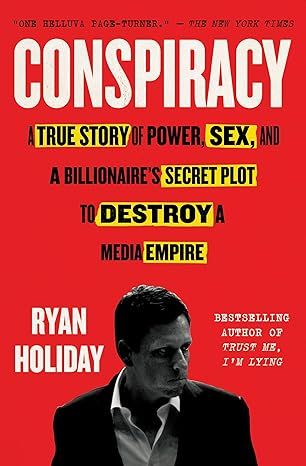
Conspiracy: A True Story of Power, Sex, and a Billionaire's Secret Plot to Destroy a Media Empire
4.3
-
1,965
$5.99
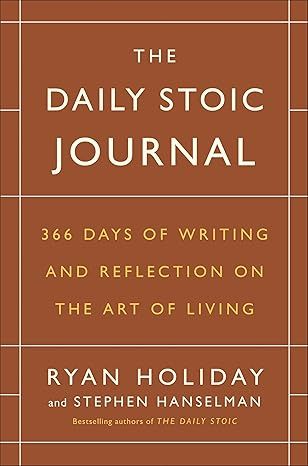
The Daily Stoic Journal: 366 Days of Writing and Reflection on the Art of Living
4.7
-
2,537
$15.99
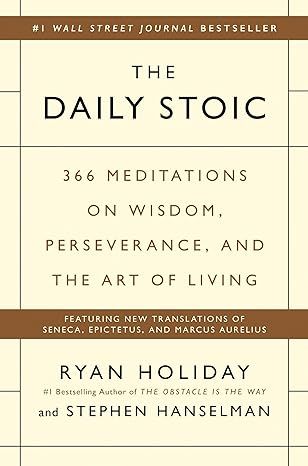
The Daily Stoic: 366 Meditations on Wisdom, Perseverance, and the Art of Living
4.8
-
32,641
$13.00
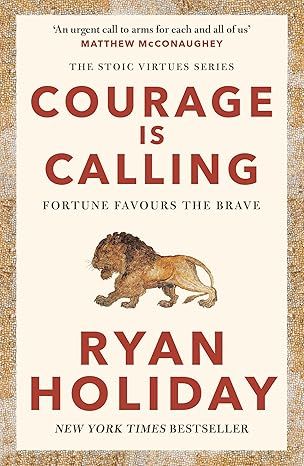
Courage Is Calling
4.6
-
4,763
$13.35
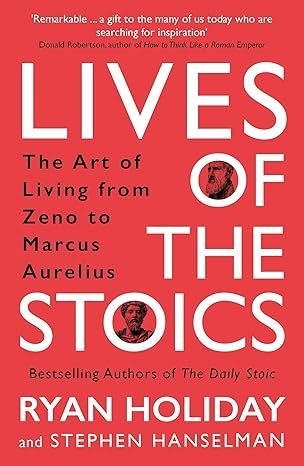
Lives of the Stoics: The Art of Living from Zeno to Marcus Aurelius
4.7
-
2,858
$8.99
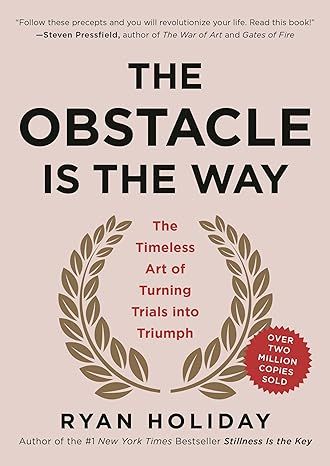
The Obstacle Is the Way: The Timeless Art of Turning Trials into Triumph
4.6
-
28,125
$4.99
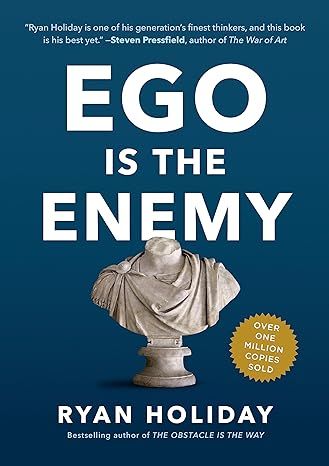
Ego is the Enemy: The Fight to Master Our Greatest Opponent
4.6
-
20,573
$11.99
Best Sellers

The Tuscan Child
4.2
-
100,022
$8.39

The Thursday Murder Club: A Novel (A Thursday Murder Club Mystery)
4.3
-
155,575
$6.33

Sapiens: A Brief History of Humankind
4.6
-
140,302
$13.49

The Butterfly Garden (The Collector, 1)
4.3
-
88,556
$9.59

Things We Hide from the Light (Knockemout Series, 2)
4.4
-
94,890
$11.66

The Last Thing He Told Me: A Novel
4.3
-
154,085
$2.99

The Perfect Marriage: A Completely Gripping Psychological Suspense
4.3
-
143,196
$9.47

The Coworker
4.1
-
80,003
$13.48

First Lie Wins: A Novel (Random House Large Print)
4.3
-
54,062
$14.99

Mile High (Windy City Series Book 1)
4.4
-
59,745
$16.19

Layla
4.2
-
107,613
$8.99

The Locked Door
4.4
-
94,673
$8.53
